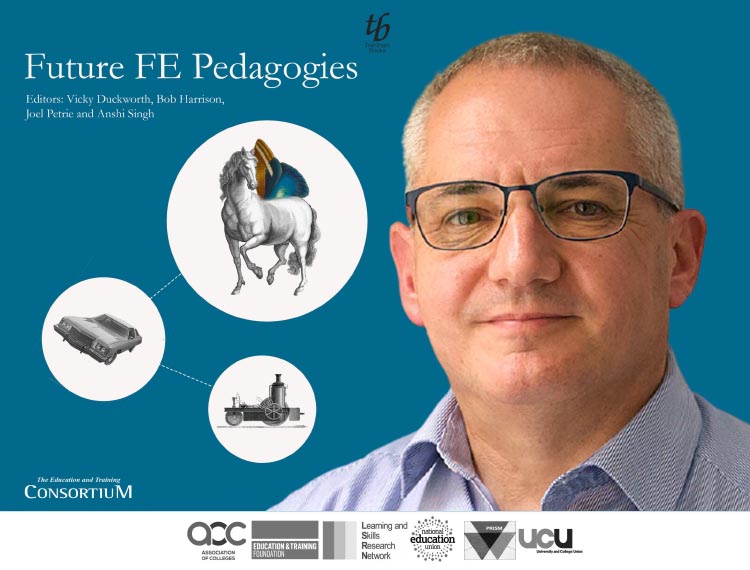Pedagogy at the centre – getting the blend right

The closure of college campuses to most students during much of the Covid-19 pandemic has led to a rapid shift towards on-line and technology-enhanced learning.
The speed of this transition has been impressive and shows the adaptability and flexibility of the FE sector, while also highlighting the risk of deepening existing inequalities, whether in access to devices, prior knowledge and skills, signposting of resources or access to professional support.
The use of e-learning has been steadily growing in colleges, with some brilliant innovative practice.
But the sudden switch to a much higher proportion of online teaching is more than the acceleration of a trend. It prompts some fundamental questions about pedagogy and the planning and organisation of learning.
As we consider the return to more campus delivery, we need to ask:
- What is it that we value most about working in a shared physical space?
- Which aspects of our learning community can and can’t be replicated on-line?
- How do we ensure that we make the best use of the time we have in different types of settings, synchronously and asynchronously?
Which aspects of learning are best suited to face to face and social settings?
On-line pedagogy cannot simply be a screen-based form of classroom pedagogy. Learning is a social process which relies on a range of different interactions between teachers and students, not all of which can be fully replicated in a virtual setting.
Are there good online substitutes for browsing in the library and discussing what to read, having a motivational chat with a tutor between classes or working in an informal study circle with a couple of friends?
We need to understand which aspects of learning are best suited to face to face and social settings and ensure we do not lose them. For example: open ended discussion, browsing together, the joint exploration and development of ideas.
This will help us make better judgements about when and how to blend these with on-line experiences, this will depend on course content and student needs. Teachers and students will need to be expert in ‘blending’; skilled at judging when and how to shift the balance.
Teaching needs to take centre stage
Young people are sometimes described as ‘digital natives’ because they have grown up using digital devices and navigating social media. However, they still need to develop research, evaluation and connective skills and their on-line fluency together with other literacies: social, political, cultural and psychological.
Producing on-line learning programmes requires good subject knowledge and expertise in pacing learning, avoiding cognitive overload and balancing challenge with security. But we also need to know our students and what makes them tick.
Whether in person or on-line, we need to motivate and engage our students as they navigate their leaning obstacle course; facing life’s challenges, seeing, or not seeing, the point of what they are doing, drifting in and out, exploring the boundaries of their knowledge, testing their understanding, trying things out, applying their skills, struggling and eventually ‘getting it’.
Much of this cannot be programmed or planned for, and our methods must take this into account.
Understanding the technology is important but realising the full educational potential of virtual learning is primarily a question of pedagogy. As we consider the future of learning, teaching needs to take centre stage.
Eddie Playfair, Senior Policy Manager, Association of Colleges (AoC)
Future FE Pedagogies – Vol 1 |
||
|
The Future FE Pedagogies journal was categorically not intended to be a ‘how to improve your e-learning skills’ guide – there are professional associations, websites and online materials fulfilling this function already. Rather, we aimed to provide for time poor colleagues a series of think pieces: nuanced analyses of the potentialities and challenges of TEL for our practice. |
||
| @AoCDavidH | ||
| @BobHarrisonEdu | ||
| @DrMattOLeary | ||
|
Free, easy and fit for purpose TEL: lessons learned the hard way by a non IT whizz |
Martin Compton |
@Mart_Compton |
|
Matt Gordon & Jan Calvert |
@mattgordonwfc @jancalvert |
|
| @eddieplayfair | ||
|
Ways of Engaging: some approaches to developing learning skills |
Ian Duckett |
|
|
The Proverbs of TEL |
Howard Scott |
|
|
Digital Practitioners creating “artfully-crafted, student-centred, learning experiences” |
Nigel Ecclesfield & Fred Garnett |
|
|
Moving a class online |
Dave Cheseldine |
|
|
The Reality of FE TEL Post-Covid-19: Thoughts from the bike by an FE Teacher Educator |
Jamie Heywood |
|
|
An open letter to the Secretary of State for Education: preparing FES teachers and trainers to ‘teach well’ in a digital world |
David Powell |
|
|
Conclusion |
Vikki Liogier |
|











Responses